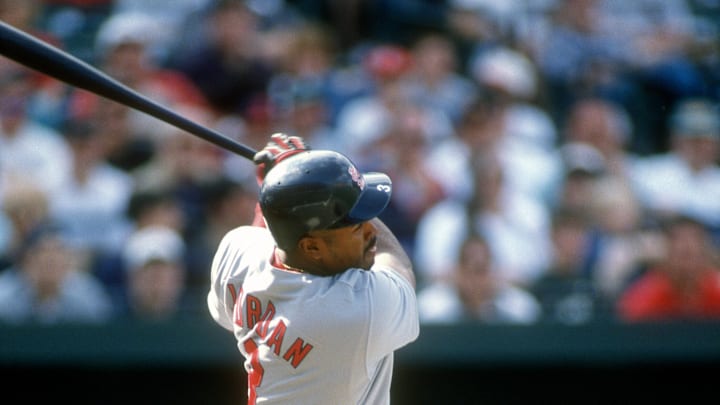Brian Jordan was one of the most underappreciated St. Louis Cardinals of the 1990s despite being an offensive stalwart and one of the greatest defensive outfielders of all time.
Some elite players are blessed with recognition and accolades throughout their career. Others, such as former St. Louis Cardinals outfielder Brian Jordan, have to scratch and claw their way into receiving any semblance of that treatment. Injuries, team mediocrity and less focus on sabermetrics at the time have kept Jordan from receiving the adulation of some other players in that era.
Jordan, the Cardinals' supplemental first-round pick in 1988, achieved his initial success not on the diamond, but on the gridiron. He was a safety for the NFL's Atlanta Falcons from 1989 to 1991 and was voted to the 1991 Pro Bowl as an alternate. In 1992, the Cardinals lured him away from football with a $1.7 million signing bonus.
Jordan's brief football career was likely the first hindrance to his baseball production. He debuted with the Cardinals at age 25, but he was still fairly raw at the game, as he hit only .207 as a utility outfielder in 1992.
In 1993, now fully committed to baseball, Jordan broke out. He raised his slugging percentage from .373 to .543 and clubbed 10 long balls. 1994 was a step back in the power department, but he made up for it by blossoming into a strong defender, where he would continue to improve throughout his Cardinals tenure.
Jordan became the Cardinals' starting right fielder in 1995, and he ran with the opportunity, hitting .296 with 22 home runs. The next year, he finished eighth in National League MVP voting, hitting .310 and .422 with runners in scoring position, which was a Cardinals record until Allen Craig broke it in 2013. 1996 also saw Jordan become one of the best fielders in baseball, leading all major league right fielders in range factor and all outfielders in total zone runs.
Injuries began to dog Jordan in 1997, and they would flare up later in his career because of his all-out style of play in the outfield. During a season interrupted by two stints on the disabled list, Jordan only managed to hit .234 and failed to swat a home run in 161 plate appearances.
Jordan's best year came in 1998: He hit 25 home runs and batted a career-high .316. Unfortunately for Jordan, his production was overlooked in favor of that of his teammate Mark McGwire, who was in a battle with the Chicago Cubs' Sammy Sosa for the single-season home run record. Thus, Jordan's career season was relegated to a footnote.
The Atlanta Braves, however, took notice of Jordan's stats and signed him to a lucrative $21.3 million contract in 1999, the year where he made his lone All-Star appearance, hitting .283 with 23 long balls. Jordan was 32 at this point, but he still had a few productive seasons left in him. In 2001, Jordan hit .295 and had his highest slugging percentage since 1998.
Jordan was traded to the Los Angeles Dodgers in January 2002, but that would be the last fully healthy season of his career. Injuries took their toll over the next four years, and Jordan retired after the 2006 season, when he was back with the Braves.
Jordan was on the Hall of Fame ballot in 2012, but he would be one and done, as he failed to receive a vote. While a Hall of Fame plaque might be asking a bit much given Jordan's career, there are a few circumstances that have prevented him from receiving the recongition he deserves.
Jordan didn't become a regular outfielder for the Cardinals until he was 28. During his time as an everyday player from 1995 through 1998, the team amassed an unremarkable 306-323 record and made the postseason only once, losing to the Braves in the 1996 NLCS. It's no secret that strong players on winning teams are in the limelight more than equally skilled players on lesser teams.
Despite Jordan finishing 15th all time in total zone runs with 163 — one zone run shy of 13-time Gold Glover Ivan Rodriguez — he never won a Gold Glove Award. Sabermetric data wasn't added to Gold Glove voting until 2013, so the award was distributed mainly through eye tests and players' existing popularity. Had Jordan played on more successful teams, as he did when he was an All-Star with the National League champion Braves in 1999, he likely would have received more consideration for the award.
Given Jordan's frequent injuries — he played fewer than 100 games in eight of 15 seasons — his relatively late-bloomer status and career year dwarfed by McGwire's season, as well as the aforementioned middling Cardinals teams, it's not a surprise that he isn't as noteworthy as some similar players of his era. Had fortune smiled down on Jordan a bit more, Cardinals fans would likely hold him in higher esteem.
